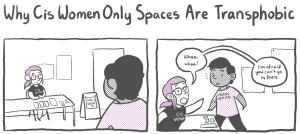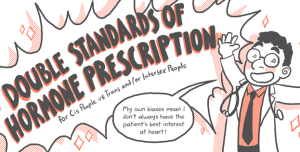
Source: The Mirror
Paid sick days — or paid time off from work when you or a family member is sick — are one of those job benefits you don’t realize you want until you suddenly really need them. It doesn’t seem like a big deal until you or someone you care about becomes ill and you need time off.
You may not realize it, but even if you have sick days, this labor issue still impacts you. With a serious lack of laws on the books in the United States, even if you currently have access to this vital benefit, there may come a time when your employer decides to no longer offer them or you find yourself in a job without them.
Make no mistake: Paid sick days are a feminist issue.
The issue intersects with dozens of others within the movement, including gender, race, class, and public health. Primarily impacting low-income workers and people of color, access to paid sick days is a privilege that shouldn’t be a privilege — it should be a right.
The ability to take time off when you or a family member is sick impacts your health, well-being, and financial security. You shouldn’t have to choose between your paycheck and your health.
The United States trails far behind most other countries on paid sick time. According to the Labor Protect for Working Families, 163 other countries around the world mandate these policies. Meanwhile, the US has no consistent laws on the books to guarantee them.
Although some states (like Connecticut) as well as some major cities (like San Francisco and Washington, D.C.) have worked to enact local laws, the large majority of those throughout the country still go without.
This has led to startling inequalities and risky health situations for workers in the United States.
So why should you care? Let me tell you.
Who Needs Sick Days
Although everybody needs access to paid sick time, very few actually receive it. According to the National Partnership for Women and Families, about 40% private sector workers in the United States, about 40 million workers, receive no paid sick leave at all.
The picture is even worse for low-wage workers and families. About 83% of workers who are paid $65,000 or more annually have paid sick days — compare that to just 28% of those who are paid $20,000 or less.
This issue also hits home hard for people of color, particularly Latinxs: Only 47% within the US have access to paid sick days.
This issue also overwhelmingly impacts women.
As they are more likely to act as the primary caregiver for children, they are often the ones who have to decide whether or not they should take the time to care for themselves or their loved ones and forgo their pay.
What Happens without Paid Sick Leave
The consequences of going without these benefits are dire.
When somebody has to take off unscheduled time because they or someone they care about is sick, they are often risk losing their job entirely. Without paid sick leave laws in place, most employers are legally allowed to fire employees for missing too many days due to illness.
To make matters worse, not having paid time off means can also mean facing financial insecurity, which in turn leads to food insecurity, home instability and other financial problems.
People without access to paid sick leave are more likely to go to the emergency room instead of going to see their primary care physician. This puts additional financial strain on both the employee — who has to pay for these expensive emergency procedures — and for the national economy, which could be spending the taxpayer money used to fund emergency room procedures elsewhere.
There are also educational consequences for going without paid sick days.
Parents without paid sick days are more likely to send their sick children to school. This not only presents a public health risk to others, but also places stress on the already limited resources of many schools that will now need to use their nurses and teachers to care for sick children.
Finally, widespread lack of paid sick leave is also a major public health issue. People without them are 1.5 times more likely than those without to go to work with a contagious illness like the flu, something that puts many others at risk for contamination and sickness.
What You Can Do About It
Now that you know how important paid sick leave is, the question remains: What can you do to improve access?
The very first thing you should do when advocating for paid sick leave policies is to check out what laws are already on the books in your state or city. This will give you a jumping off point, and if your state mandates benefits that you are not receiving, you will know your grounds for taking legal for action or not.
If your state does not mandate these policies (and most do not), there are still things you can do to advocate for them.
If possible, your best option for pushing for paid sick leave policies in your workplaces is to unionize or join your union. Collective bargaining is a powerful tool that can allow you and your co-workers to demand the benefits you need, and codify the ones you already have so they can’t be taken away at a later point. They can even protect you from retaliation from your employers.
Another way great way to get these benefits is to negotiate for them when you begin a new job, especially if you anticipate needing extra time off to address pre-existing health concerns for yourself or your family. If your workplace doesn’t have a codified paid sick leave policy, be sure to ask about including it in your contract while negotiating your salary.
Keep in mind that this is definitely a privileged viewpoint. Hourly and low-wage workers may not even have an opportunity to negotiate a contract in the first place.
The unfortunate truth is that for many, advocating for paid sick time simply is not an option. Many in low-wage jobs and un-unionized jobs have little bargaining power and are not protected from retaliation from their employers.
This is why advocating for paid sick days policies on a state and federal level is critical.
Although there are no far-reaching laws ensuring paid sick leave currently on the books, the Healthy Families Act could change all of that.
It would allow for “workers to earn up to seven paid sick days a year to recover from short-term illness, care for a sick family member, attend medical appointments, or seek assistance for a domestic violence, stalking, or sexual assault issue.”
To support related legislation, be sure to contact your state Representatives in the House and the Senate and let them know why these issues are important to you.
You can also get involved in the fight for paid sick time through the National Partnership for Women’s Support Paid Sick Days campaign, which is leading the way in advocating for related policies and legislation.
Finally, don’t forget to continue to talk about why this issue matters to you and your community. Being a vocal advocate can bring others into the cause and put a human face on why this issue matters.
There is plenty that you can do to advocate for every employee’s right to take care of themselves and their loved ones. So go do it.
[do_widget id=”text-101″]
Want to discuss this further? Visit our online forum and start a post!
Ally Boghun is a Contributing Writer at Everyday Feminism. She is a feminist activist and media researcher living and working in Washington, DC. Ally completed both her B.A. in Communications and Art History as well as her M.S. in Professional Communications at Clark University, where she researched abortion debate rhetoric. She is also the founder and editor of Because I am a Woman, a blog devoted to intersectional feminism and reproductive justice. In her spare time, you can find her at an art museum, consuming massive amounts of coffee while writing, or trying to convince her cat to go for walk. You can follow Ally on Twitter @AllyBoguhn. Read her articles here.
Search our 3000+ articles!
Read our articles about:
Our online racial justice training
Used by hundreds of universities, non-profits, and businesses.
Click to learn more




















